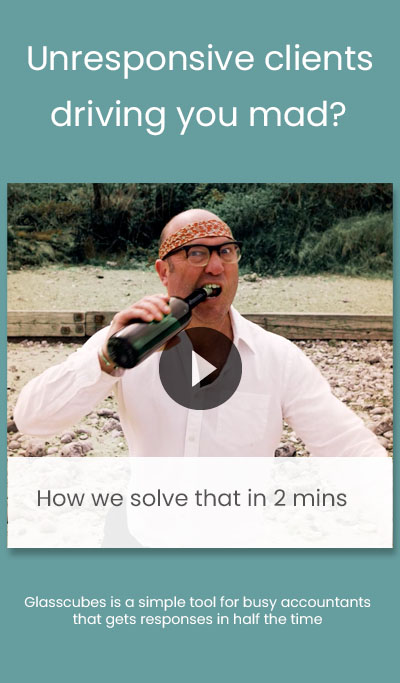The Hidden Cost of Chasing Clients
on 6 May 2023
Accounting processes aren’t meant to be time-consuming, but clients often make it seem that way.
Anyone who manually processes payroll or expenses, attempts to close books on time or examines transactional data for insights knows the pain of having to chase for information, send constant reminders, and go back and forth over email until the right data is sent.
This aspect of the job is routinely listed as the most torturous for accountants, stuck in seemingly endless loops of requesting documents multiple times for tax, compliance, invoice, report filing.
So draining are the awkward conversations over payments or repeated requests for receipts and accurate invoices, that expending all this energy on sunken hours also takes a significant toll on the mental health of finance professionals, according to research.
Most significantly, these out-of-scope efforts eat into billable hours and can cost practices of between 1-50 staff on average £70k a year, or nearly £6,000 per month. For small-to-medium-sized businesses with little room for error compared to larger firms, these are not insignificant sums.
Losing such a significant chunk of revenue through inefficient workflow processes - enough cash to hire one or two new employees - is not a foundation for long-term success.
Why chasing clients is a significant drain
Businesses seeking to grow or reduce overheads will often look first at the low-hanging fruit; staffing needs, cheaper suppliers or office space. There is often a reluctance to consider changes to back office functions like finance systems as “it’s the way things have always been done”.
The accounting function is the lifeblood of any business, however, and not just because it controls cashflow and keeps the lights on.
Finance departments and individuals responsible for accounts payable, tax compliance, payroll and other cash-in, cash-out tasks play a crucial role in business continuity, as they often have a direct relationship with clients and customers.
For accountants in practice, the problem is even more acute. The way they communicate with and extract the necessary information from their clients ultimately determines how much work can be taken on and how healthy the bottom line looks.
Knowing where the bottlenecks lie is the first step towards improving productivity and profitability, and shortcomings in client communication
Having to constantly chase clients leads to:
- Getting paid late
- The inability to take on new work
- The increased likelihood of errors occurring
- Unbalanced workloads during busy periods
- Increased risks related to weak audit performance
It’s a simple fact that your work cannot move forward or progress until you receive client’s information, which leads to frustration, further delays, lost income, and more tasks piling up.
Taken together, it is very easy to see how £70k could slip down the drain. That number may even seem cheap when measured against the loss of multiple new clients or having to replace employees who have become disillusioned and left the profession.
Accounting’s Kodak moment
There are also wider industry trends at play. The Institute of Chartered Accountants in England and Wales (ICAEW) says the future of audit depends on significantly better information gathering tools.
Multiple high-profile corporate failures in recent years, including Carillion, BHS, Thomas Cook, Patisseries Valerie and others, have drawn headlines over their poor auditing, but the regulators believe the problem is endemic.
Accountants and auditors often struggle to get the information they need, cannot reduce the risk of material misstatements and occasionally miss instances of fraud, leading them to complain they are held responsible when something goes wrong.
In response, the sector is pushing for more advanced reporting controls, and automated and robotic solutions that strengthen the integrity of auditing, starting with improvements in how information flows between bookkeeper and client.
Digital disruption comes for everyone, eventually. And accounting is just as susceptible to technological upheaval as any other sector.
A PwC report on the future of the chief financial officer role predicts further digitalisation of the finance office is inevitable. Those firms who do not move with the times and transform their services and systems with better technology risk falling behind competitors, and may eventually go bust.
To avoid becoming the Kodak or Blockbuster of the accounting world, firms need to prioritise client engagement, offer simpler and more efficient ways to get vital information, and above all, stop wasting their time and money chasing for information.
Removing bottlenecks with intelligent technology
“Have you ever asked why it’s so difficult to get things done in business today, despite seemingly endless meetings and emails? Why it takes so long to make decisions, and even then not necessarily the right ones?” says McKinsey senior partner, Aaron De Smet.
Many organisations look the wrong way when hoping to address these problems, avoiding what, in De Smet’s experience, is the underlying disease; “the poor design and execution of collaborative interactions”.
Requesting different types of data from clients, switching between multiple communication channels, email, phone, text, WhatsApp, iMessage or other chat apps only adds to the inefficiencies. The “two seconds here, a minute there” losses in productivity quickly multiply when accountants are stuck with outdated technology, or use fragmented, incompatible systems to communicate and exchange data with their clients.
Accountants should be spending time developing plans and strategies, providing business insights and adding value via billable hours, not tackling routine data management.
Smarter tools, particularly centring around information gathering and streamlined communication channels can unlock efficiencies capable of transforming the direction of a company.
Modern, intelligent client portals provide a safe, secure, and efficient avenue for exchanging information and data, drastically reducing the need to chase for information and taking time away from more important tasks.
Powerful automated processes eliminate the need for manual input, reducing the chances of errors creeping in, and can be programmed to ensure similar requests are sent to multiple customers until all the relevant information is obtained.
The result is more time saved, fewer errors, and accountants freed up to focus on growing their practice by adding more clients or offering a greater and more lucrative level of services. No more chasing, no more headaches, and a path to greater profitability awaits.
Discard the mundane and free up your time
Stop chasing people for information, Glasscubes will do that for you. Discover how we can save you time and eliminate the tedious task of constantly emailing clients for outstanding information. We help accounting professionals work smarter, faster, and with less effort. Contact us today!


